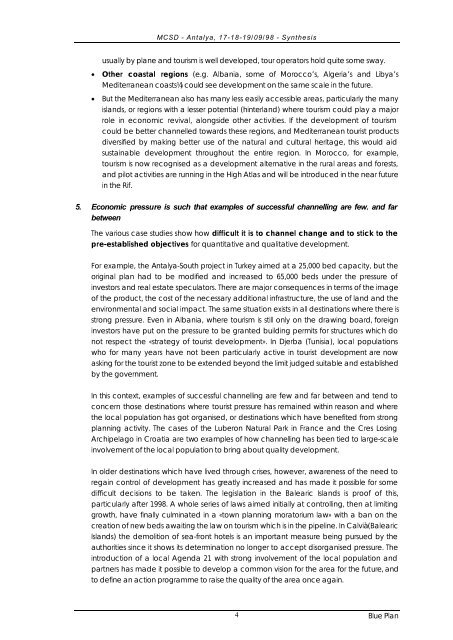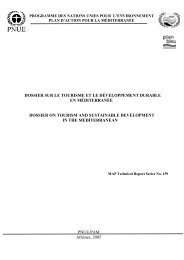MEDITERRANEAN ACTION PLAN
MEDITERRANEAN ACTION PLAN
MEDITERRANEAN ACTION PLAN
Create successful ePaper yourself
Turn your PDF publications into a flip-book with our unique Google optimized e-Paper software.
MCSD - Antalya, 17-18-19/09/98 - Synthesis<br />
usually by plane and tourism is well developed, tour operators hold quite some sway.<br />
• Other coastal regions (e.g. Albania, some of Morocco’s, Algeria’s and Libya’s<br />
Mediterranean coasts¼) could see development on the same scale in the future.<br />
• But the Mediterranean also has many less easily accessible areas, particularly the many<br />
islands, or regions with a lesser potential (hinterland) where tourism could play a major<br />
role in economic revival, alongside other activities. If the development of tourism<br />
could be better channelled towards these regions, and Mediterranean tourist products<br />
diversified by making better use of the natural and cultural heritage, this would aid<br />
sustainable development throughout the entire region. In Morocco, for example,<br />
tourism is now recognised as a development alternative in the rural areas and forests,<br />
and pilot activities are running in the High Atlas and will be introduced in the near future<br />
in the Rif.<br />
5. Economic pressure is such that examples of successful channelling are few. and far<br />
between<br />
The various case studies show how difficult it is to channel change and to stick to the<br />
pre-established objectives for quantitative and qualitative development.<br />
For example, the Antalya-South project in Turkey aimed at a 25,000 bed capacity, but the<br />
original plan had to be modified and increased to 65,000 beds under the pressure of<br />
investors and real estate speculators. There are major consequences in terms of the image<br />
of the product, the cost of the necessary additional infrastructure, the use of land and the<br />
environmental and social impact. The same situation exists in all destinations where there is<br />
strong pressure. Even in Albania, where tourism is still only on the drawing board, foreign<br />
investors have put on the pressure to be granted building permits for structures which do<br />
not respect the «strategy of tourist development». In Djerba (Tunisia), local populations<br />
who for many years have not been particularly active in tourist development are now<br />
asking for the tourist zone to be extended beyond the limit judged suitable and established<br />
by the government.<br />
In this context, examples of successful channelling are few and far between and tend to<br />
concern those destinations where tourist pressure has remained within reason and where<br />
the local population has got organised, or destinations which have benefited from strong<br />
planning activity. The cases of the Luberon Natural Park in France and the Cres Losing<br />
Archipelago in Croatia are two examples of how channelling has been tied to large-scale<br />
involvement of the local population to bring about quality development.<br />
In older destinations which have lived through crises, however, awareness of the need to<br />
regain control of development has greatly increased and has made it possible for some<br />
difficult decisions to be taken. The legislation in the Balearic Islands is proof of this,<br />
particularly after 1998. A whole series of laws aimed initially at controlling, then at limiting<br />
growth, have finally culminated in a «town planning moratorium law» with a ban on the<br />
creation of new beds awaiting the law on tourism which is in the pipeline. In Calvià (Balearic<br />
Islands) the demolition of sea-front hotels is an important measure being pursued by the<br />
authorities since it shows its determination no longer to accept disorganised pressure. The<br />
introduction of a local Agenda 21 with strong involvement of the local population and<br />
partners has made it possible to develop a common vision for the area for the future, and<br />
to define an action programme to raise the quality of the area once again.<br />
4<br />
Blue Plan
















